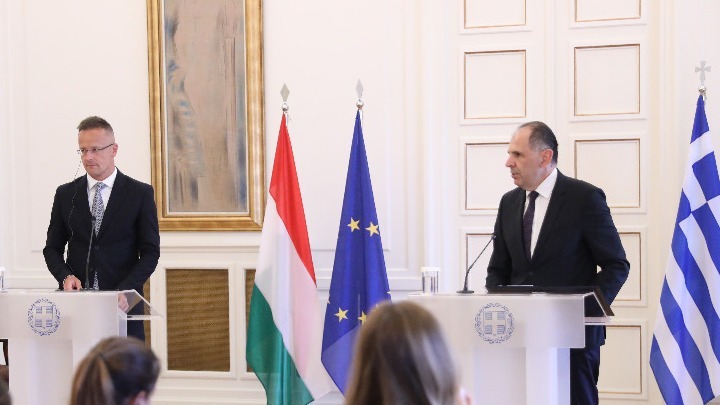FM Gerapetritis meets with his Hungarian counterpart Szijjártó

The further strengthening of the bilateral relations, the Greek minority in Hungary, the dramatic developments in the region, migration and the Western Balkans EU accession course were the main issues discussed at Foreign Minister George Gerapetritis' meeting with the Foreign Minister of Hungary Péter Szijjártó on Wednesday.
Gerapetritis praised the long-standing friendly relations with Hungary, stating that "there could be no better example than the Greek diaspora in Hungary, which for all these years has been a bridge of friendship between the two countries." It is noted that the representative of the Greek minority in the Hungarian Parliament, Laokratis Koranis, was also present at the foreign ministry.
"It is known that occasionally we disagree with Hungary, but Greece is always willing to transcend differences, to discuss, and to seek points of convergence," emphasised the Greek minister, noting that their discussions also touched on EU enlargement, the Western Balkans, and their European perspective.
Gerapetritis expressed support for the accession of Western Balkan countries and emphasised the need for stability: "We must work to make the Balkans an area of consultation, not a hotbed of tensions and nationalisms. In this climate of uncertainty and upheaval, we cannot afford to create another minefield. As an older EU member state in the region, Greece will continue to actively support the EU enlargement process and the accession of the Western Balkans."
He also mentioned exploring ways to enhance bilateral cooperation in the economy, investments, and tourism, and made specific reference to the energy sector: "New geopolitical challenges demand the fortification of our countries. One key area is energy. Greece has set a strategic goal to become a major energy hub, contributing decisively to national and European energy diversification and security."
Regarding migration, the Gerapetritis noted that "we can do more to protect our European external borders."
Concerning the serious escalation in the broader Middle East, both foreign ministers agreed on the need for immediate de-escalation for regional security and stability, with Gerapetritis stressing that diplomacy must be the only solution.
"We coordinate our actions at both the European level and within the UN Security Council, where Greece-having been elected, and in cooperation with other EU member states-echoes the voice of the EU," he emphasised, concluding: "Our priority remains the safety of Greek citizens and diplomatic staff in Israel and Iran. As of last night, the Greek operation to evacuate 151 people from Israel, including two Hungarians, was successfully completed. When we unite our forces, we are stronger."
On his part, the Hungarian foreign minister said Greece-Hungary relations are successful, noting that "last year we broke export records-800 million euros to Greece-and the number of Greeks who visited Hungary reached 100,000 per year.”
He also stated that "we will support the Greek minority in Hungary to maintain its identity," and emphasised that his country keeps its borders strong and does not allow illegal migrants to pass through.
He further spoke about Hungary’s energy challenges following the EU’s response to Hungary’s migration stance, stressing that "Hungary’s energy security is at risk and there is a danger of prices doubling."
Finally, he described the EU’s "energy package" as violative of Hungary’s sovereignty regarding its energy mix, labeling it "unacceptable," and thanked Greece, noting that Greece "adopts a tactical approach in energy matters."

















































































